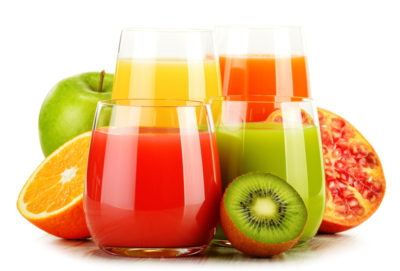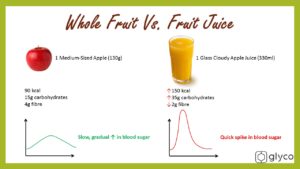
Fruit forms an important part of a healthy well balanced diet supplying vitamins, minerals, fibre and phytonutrients (chemicals found in plants which offer a lot of health benefits). It is common practice to see parents reassured that their child has an intake of fruit since they love fruit juices. But is drinking a fruit juice the same as eating the fruit?
Once a fruit is blended or juiced, the structure of the fruit changes and so do its total health benefits. Below is a short list explaining some differences between drinking a fruit juice and eating fresh fruit.
- Lost nutrients: When you eat a whole fruit you are consuming the juice, pulp and sometimes the skin. The edible skin of the fruit is high in phytonutrients such as carotenoids and flavonoids while the pulp is high in fiber. During the juicing process these nutrients and their benefits are often lost resulting in a lower nutritious value.
- Less satisfying: Once the fruit has been juiced, the structure is changed. Chewing is no longer required and therefore drinking juice is not as satisfying as eating a fruit often leaving you hungry and more likely to snack afterwards. The fiber content in the whole fruit also helps you feel full.
- Spike in blood sugar level: The juicing process results in a more concentrated source of natural sugars which is absorbed quicker and more easily when compared to that in a whole fruit containing fiber. This concentrated source of sugar results in a rapid increase in blood glucose similar to the effect of drinking a soft drink. Furthermore, some commercially available juices have added sugar and/or sweeteners.
- Higher in sugar content: If you squeeze a single orange, the amount of juice made is so small that you would need 2-4 oranges to fill one glass of juice. Therefore one serving (1 glass) of orange juice would be higher in calories and sugar than 1 serving of fresh fruit (1 medium -sized of orange).
- Impact on tooth decay: Drinking acidic fruit juices such as orange, grapefruit and pineapple can also increase the risk of tooth decay.

To answer the above question, eating fresh fruit and drinking a juice is therefore not the same. It is definitely better to eat fresh/frozen fruit rather than drink it. However, should you or your child not like eating fruit, drinking fruit juice instead of soft drinks is still a better option. Fruit juice contains vitamins and minerals while soft drinks contain just ‘empty calories’. Below are some recommendations to follow.
For a one minute video clip showing the difference between fruit and fruit juice click here.
- 100% fruit juice (with no added sugar) is OK to have occasionally – not more than 1 glass of juice a day. Ideally this should be diluted with water and offered only at mealtimes
- Making a smoothie rather than a juice would be a better option. The fruits in a smoothie are blended and not juiced using the whole fruit. This means that they have added fiber from the skin and pulp. The fiber in a smoothie will keep you fuller for longer and allows for a slower spike in blood glucose when compared to that of a juice. You can also add some vegetables to the smoothie to increase the fiber content even further. Be careful some smoothies may contain high levels of fats and sugars depending on the ingredients used.
| Fruit | Fruit juices |
| High in fiber | Low in Fiber |
| Helps you feel full | Leaves you feeling hungry |
| Maintains blood sugar level | Increases blood sugar level |
| Good for weight management | May lead to weight gain |
AUTHOR : Melania Spiteri B.Pharm (Hons), pg dip nutr & diet, M.Ent.
Melania is a state registered pharmacist and nutritionist.
